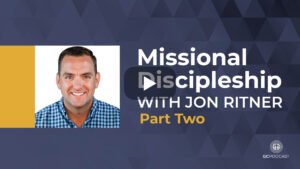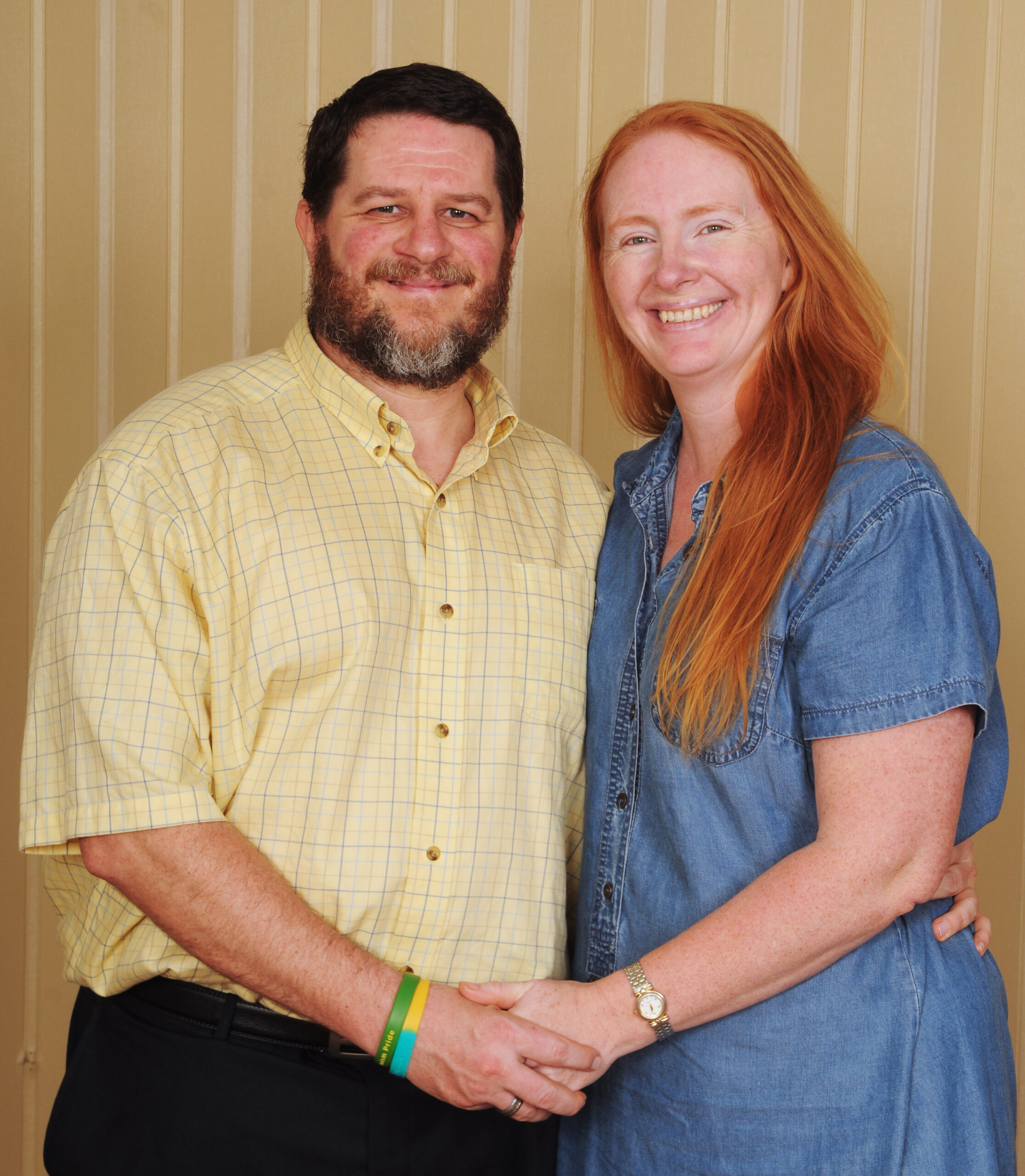Story of Love: Kansas City w/ Terry McDonald & Barbara Leatherman
Welcome to the GC Podcast, a podcast to help you develop into the healthiest ministry leader you can be by sharing practical ministry experience. Here are your hosts, Cara Garrity and Charissa Panuve.
Cara: Welcome all to today’s episode of GC Podcast. I’m here once again with my co-host, Charissa Panuve.
Welcome, Charissa. It’s good to have you here with us today.
Charissa: Hi everyone. It’s great to be back joining in on another episode. I’m super excited.
Cara: Yes. And one of the most special things to me about this season is the emphasis on Jesus being with us, his solidarity with humanity, Emmanuel, God with us.
I’m wondering, Charissa, what about this season of Advent is really meaningful to you?
Charissa: Yes. Amen to that.
I love the Advent season and the fact that I somehow managed to find five or 10 kilos during this season, I think is pretty special. But other than that, the fellowship and the togetherness that this time brings not only for the churches but within our families, I think is a very special time.
And to remember this season and reflect on our Savior when he first came into the world, in the flesh and what that led to, and sharing that with one another, I think is a beautiful thing to always look forward to about this season.
Cara: Mm. Yeah, that relationship and fellowship, that’s a wonderful thing. Thank you, Charissa, for sharing that.
And in today’s episode, speaking of, of relationships and fellowship, we’re going to hear from Barbara and Terry who are the Love Avenue champion and pastor at GC South Kansas City USA, about their journey in the Love Avenue. Before we get into that interview, I’m wondering what has been a formative movement of your own journey in the Love Avenue ministry of mission and witness?
Charissa: Ooh. Personally, I enjoy doing things hands-on, so I enjoy working with the youth leaders back home (when I am home, that is) and helping with the outreach in the community. For me, prior to the introduction of this Team Based—Pastor Led and the different Avenues that it broke down into, particularly Love Avenue ministry outreach was not something that was as commonly practiced with the youth as it is now.
So, getting started on that and working towards sharing the love beyond the church walls was such an experience and a blessing. And it really did open our eyes to the fact that you could witness and share the love of Christ in practically anything. We would do things for sports days that were open to all or cleaning up yards for different people, just to share our time and love with those around us and reflect Jesus in what we do.
Cara: Amen. And one of the things that really strikes me about your experience is the inclusion of youth in the ministry of the Love Avenue. I really love to hear that. That’s excellent. And I praise God for that part of your own journey in his ministry.
Why don’t we go ahead and hear what God is doing in GC South Kansas City, USA?
Cara: Hello friends and welcome to today’s episode of GC Podcast. This podcast is devoted to exploring best ministry practices in the context of Grace Communion International churches. I’m your host Cara Garrity. And today I am so, blessed to interview Terry McDonald and Barbara Leatherman. Terry is pastor of Grace Communion South Kansas City, and Barbara is Love Avenue champion there.
Barbara and Terry, thank you so, much for joining the pod with us today. It’s so, good to have you.
Barbara: Thank you for having us.
Terry: It’s so, good to be here.
Cara: Yes, of course. It’s my pleasure. And today I’m really excited because you’ll be sharing a little bit about your journey in the Love Avenue as a testimony or a real-life storytelling of what it looks like when we put all of what we’ve been learning about the Ministry of the Love Avenue, put flesh to it.
And so, I would love if you could just start us off, Barbara, with telling us a little bit about the Outside the Walls event that you all just had this summer.
Barbara: We had a neighborhood block party. We had it on June the 25th. It was one of the hottest days of the summer so, far. And we enjoyed it very much, but we worked really hard, and we were really tired.
But it was a great event. We met at a local high school at their ball field. So, it was very visible to everybody around. We had about 23 families join us for that. And we had a really good time. We had a DJ that played music and kept us going. And we had about 15 or so, games for the people that came to play.
We had prizes and treats and we had a face painting table and some bouncy houses for the children. We had some food trucks come in, which was really wonderful. So, that’s an overview of what we did.
Terry: Yeah, it was a really fun event, like Barbara said, in spite of the fact that it was really hot. I think the heat index got up to a hundred something degrees.
When we first started, the skies were overcast, so, it was nice to be able to set things up, but we could feel the heat beginning to rise. And me personally, I began to have some concerns, obviously. Oh, there’s a lot of heat here. Is there going to be anybody going to show up?
But like she said, we had about 23 families about a hundred people together show up and it was just a really great time to be able to come together as a team and just be able to share the love of Christ with them. So, it was a great.
Cara: Yeah, that sounds like a wonderful event.
I would go to something like that. And I’m wondering what did you see God doing concerning that gathering?
Barbara: God was working on our hearts in South Kansas City, and we saw God drawing us together, the Love Avenue team and the congregation. He was drawing us together showing us how the process worked and helping us to come together for a common goal.
I think he was shaping us for the things that are coming ahead for our congregation. And teaching us to trust him because a lot of times we try to do things on our own. But he was showing us how to trust him at this time, and I saw him open doors.
In the very beginning, he opened up this high school ball field to us. We didn’t know what they were going to require or anything. But right away, they agreed to let us use it. And they said, because we were doing it for the community, they didn’t charge us anything. We felt like that was a blessing from God.
And then they let us know after a time that we could use their trash facilities and their dumpsters, so, we didn’t have to go to the city and purchase those things. And that saved us about, I’d say $700 close to that. These were just a few things that I saw as blessings.
Terry: Yeah. It was really interesting that during this entire planning process, when we first got the call from our regional pastor, Mike Rasmussen, and he was sharing with us that we were being called to do an Outside the Walls event.
And obviously when that came to the forefront, there was this expectation in our own hearts (maybe individually, I know, certainly in mine) that this was supposed to be some outlandish, outrageous, huge, crazy-looking event. And I learned that I need to listen to my team a little bit more. (We’ll talk about that a little bit later.)
But I really saw God bringing us together to show us what he was doing in our neighborhood. And what I mean by that is, a lot of times it might be misunderstood that an Outside the Walls event is for the neighborhood or for the community that you’re serving. And while part of that is true, it’s really about calling the church from inside, “Come out of the building and find the spaces and look for the spaces and see the spaces where Jesus is working.”
And we knew from the beginning that this was going to be an all-hands-on-deck type of thing. It was almost like the first four or five months, we were doing a lot of vision casting, Barbara and I, about what this was going to look, like what it should be. And, for the first couple of months after Mike mentioned it to us, we had no idea what this was going to look like.
We were just all over the place trying to figure out what are we supposed to be doing? And, so, Barbara had the idea – we were doing game days in the park where we just take a couple of games out to a local park, maybe about a mile away from where we meet. And we set them up and the kids that were there on the playground or anybody else that was in the park, they’d come over and play some games with us. And they’d win prizes and we’d be able to talk to them and connect with them in that way.
And so, Barbara said, why don’t we just expand that a little bit. And when I hear the word expand, I need to tone back a little bit because I get crazy with the word expand. My voice is that of Creative, Connector [GiANT Worldwide 5 Voices.] So, the creative part of me really came out in volumes. But we knew that’s what that was going to be.
But we recognized at this time that God was giving us an opportunity to live out the theme that GCI has proclaimed this year: being compelled by love as well as our local focus of being intentional in exercising that love. God gave us the opportunity to do that, and it was a great time.
It was a great lesson for all of us about what that means.
Cara: Yeah. Thank you both for sharing that. And I love what you just shared, Terry, that part of the idea is get outside of the walls of the church building, because when you do that, what you see is that God is doing a lot! Jesus is actually in our midst.
And Barbara, from what you shared there, you guys experienced that in really tangible ways. That he’s building relationships within the community, within your neighborhood, that are beneficial. Allowing you guys to come into a space and connect with people opening those doors. And I think that’s an incredible thing to celebrate.
And so, we do want to celebrate that alongside you all, that God is doing a good thing and that you all have taken the steps to be “sent” people that are going to say, Yeah, God, we’ll walk outside the walls of the church because we know that you’re there too.
So, is there anything else that you’re celebrating on the other side of this event that you’ve hosted this summer?
Barbara: That’s a good question, Cara. I celebrated that the event came together and that it worked well because when we started, we didn’t know how this thing was going to work out, and I celebrated the families that God brought and that we actually survived the heat for such a long event.
I celebrated something else. Our members – a lot of our members and we’re not a great big church – but a lot of them are in advanced ages, I’d say, in the seventies, eighties. And they haven’t done a lot of this outside kind of thing. And they themselves became willing to come out and enjoy the event even for a time.
And I would have to say that our church members have been fairly stuck in their traditional ways. So, I was celebrating the fact that they were starting to get the vision and that they were willing to come out and celebrate with us.
Yes. So, that’s some of what I found to celebrate.
Terry: Yes. I echo that Cara, I echo that.
It was really refreshing to literally see people stepping outside of the walls. And when I say stepping outside of the walls, I’m not talking about stepping outside of the walls of the church building but stepping out of the walls of their own heart. Outside the walls of their own heart and saying, maybe God is doing something and if I stay stuck in my ways of thinking or I stay stuck in my space, perhaps I’m going to be missing out on seeing a chance for him to really open me up to see what he’s doing.
And it was a very trying process, putting this entire event together. And again, I take a lot of responsibility for that because of my Creative voice. But it was a trying process, us trying to organize all these big things and looking at the size of our team.
And, living in those realms of doubt, are we doing too much? Are we not following God’s direction? Are we doing something that we want to do and putting God’s name on it? (That’s a scary thing to do.) But what we got to the point of discovering is that we were recognizing that we were small, but we could be mighty if we just followed God’s direction and surrendered to his will.
And another thing I discovered was through the trials and frustrations and all the misunderstandings that came throughout this flow – Barbara keeps preaching to me that we need to improve communication. And she’s absolutely right. But what I discovered is that we started building strong relational bonds between each other through this process.
And it was really healthy and great because, I think that really helps to sell a vision when you are doing vision casting because people then begin to trust the direction that you’re leading. And they will feel safe and secure, which is two things that humans love: safety and security.
And in doing that and seeing it all come together at the end; we all recognized, we really can trust each other if we surrender to the will of God.
Cara: That is absolutely worth celebrating, the transformation of people that you both witnessed, including yourselves. Because as we participate in Jesus’ present ministry, his mission, the activities that he’s up to, or what we might call, the ministries of the Love Avenue, man, we’re transformed because we’re participating in what he’s doing in our midst.
That’s incredible.
And so, I’d love to ask you, Barbara, it sounds like there was a lot going on and a lot of things that, that you all learned. What last couple of things do you want to share with our listening audience that you learned that you’ll definitely carry forward with you?
Barbara: That is interesting that you asked that, and Terry touched on something about our voices. And I learned personally that as his voice was that of a Creative, Connector. Mine was that of a Nurture or Guardian. So, while it was good to learn what our voices were, we came to see that they were very different.
I learned that we don’t always understand what each other is saying or thinking because we don’t recognize the different voices. So, we tended to make assumptions about certain things, and we stepped on each other’s toes a little bit. But we learned that our voices are not enemies and that they’re all valuable and necessary, to accomplish the whole purpose.
And like Terry said, we have to learn to listen to each other and see the different perspectives and try to make decisions together and not try to do it on our own. We learned a lot about teamwork, and we learned – I think Terry mentioned this – we learned that our events don’t have to be great big and huge to be effective and to love our neighbors.
We can scale them back and we can work on a little different level. And next time I think we’re going to make some things more streamlined. And one thing I noticed that our event, because it was in a ball field, we were very spread out because it was a big area. And I think if we do this again, or even in other events that we do, that we want to bring our activities closer together so, that we can fellowship a little better with our guests.
And we also, learned that we had originally planned on doing this for four hours and somehow it turned into a six-hour event, and it was too hot for that. Plus, really I think we would’ve been able to accomplish our goal in a shorter duration, have more events for shorter periods. So, I think we learned a lot about handling an event and all the things that go into it.
So, that’s some of the things that I felt were important to learn.
Cara: Yes, learning how to send people home, Barbara, is critical!
But I also really appreciate what you said about the voices and teamwork because, GC podcast is about best ministry practices in GCI, and in GCI, we believe in Team Based ministry.
And so, what you’ve talked about, that’s critical across all of our expressions of ministry: Love Avenue, Faith, Hope, whatever the teams, sub-teams in those Avenues. And so, thank you for bringing that insight.
Terry, is there anything that you would add? Key pieces of learning that you’re going to bring forward with you?
Terry: Oh, yes, absolutely. I’m glad you asked this question because it is a huge thing. I may have touched on this a little bit already, but I’ve learned that with Creative, Connectors, being a bull in a china shop only works if there’s no china in the shop. Okay. You trying to run through everything and get everybody to follow your direction and all of that good stuff, and you’ve got to listen to the hearts of your team sometimes – and I’m not speaking for every pastor – but there are some of us out there who sometimes get in that mode where we know everything that needs to be done.
And sometimes we’ll even try to do it all ourselves, but we’ve got to listen to the hearts of our team. I’ve had some experience in putting certain events together large and small, but everyone on my team did not have that same experience. And Barbara alluded to that when she was talking about our voices and I in this planning session.
I forgot to listen to those voices because I was so adamant about making sure that this was a success and perfect. And I needed to listen to their hearts, and I needed to listen to their voice. And casting a vision is so important to help others see from their perspective how they can participate in engaging the call that we’re being called to.
And if you’re too busy only listening to your voice and doing what you want to do, not only are you going to set up a situation where they’re not going to be able to hear what the Lord is telling them, but they will also not feel included, not feel welcomed, not feel wanted into the situation. And learning that everyone has a different voice and not only learning that they have a different voice, but recognizing that those voices, those different voices are inside of me as well. I needed to listen to those voices inside of me and praising God, that as we got closer to the actual event happening, that I began to recognize that and see that. See what I was doing was actually detrimental, not intentionally, but detrimental to what God was trying to do with us.
We are all relational beings, and I feel God created us that way so that we can discover the joy of building those symbiotic relationships with each other and with Jesus. And I learned that listening intently to the other truly is an act of love and going forward.
I communicated that with Barbara, that she is so wise in some of the things that she brings forth and how she helps me to see things in a different light that I recognize I need to listen to my Love Avenue champion a little bit more. And I won’t stress myself out so much if I start keeping things a little simpler. So, that’s what I learned.
Cara: Thank you, Terry. I really appreciate you sharing that. Again, highlighting the importance of team based ministry.
And not only that, one of the things that I think of when you share that, is putting together, organizing, planning, whatever you want to call it, activities within the Love Avenue, it’s more than about just that activity. When you do things the way that you’re talking about, where you’re creating space and listening to people and figuring out how is God calling each person to participate in what he’s doing, that’s actually discipleship and an opportunity for discipleship, not just event planning.
And so, then it’s ministry for all of us to be able to participate in, which is so important for us as leaders to allow these spaces to be areas of disciple-making. Because as a church, that’s what we are called to. And so, thank you for sharing that because it is easy, I think, for us to default to just activity making instead of disciple-making.
Yeah. And so, that’s really critical. So, I appreciate you both and I’m so thankful for what God did through this event in your neighborhood and for y’all’s willingness to step out and try something new, get outside those walls. And so, we’re celebrating with you.
We’re praising God right alongside you. And now I want to back up just a little bit because you’ve already alluded to this a little bit. It’s been a whole journey for you all as a gathering church community, even getting to the point of this outside the walls event and coming out of this Outside the Walls event.
And so, I’d love to just hear a little bit more about your guys’ personal, as Terry and Barbara, and then collective, as Grace Community South Kansas City’s journey in the ministry of the Love Avenue.
And so, where did you all start in your understanding and participation in the Love Avenue?
Barbara: That’s a really good question, Cara.
Terry: Yes, it is!
Barbara: I’m sure we have different perspectives on that. Personally, I’ll talk from my standpoint. I had been serving for a number of years with the elderly and the shut-ins. So, I developed a lot of compassion for people and empathy. And then I started working with the local schools and worked in those, and I felt like I fit in well with the Love Avenue.
But as I got involved in it a little bit more, I soon learned that there was a lot more involved than that. And I was challenged quite a bit. I had to put together a team and that was challenging.
And at times, I would feel like – because we have a small congregation – I would feel like, who can I get on my team? Nobody really wants to go out and do things — because I didn’t see that. And so, it was challenging to listen to other people and hear what they were thinking. And that way, I could put together a team with those people with their different thoughts and ideas. And it was challenging for me to learn how to lead others and how to inspire them.
I think sometimes when we look at something – in this regard, it was the Love Avenue champion – and I’m thinking, I’m not a champion. What does that mean? And so, it challenged me to think that what it means is that I have the challenge of leading other people and learning about them and letting them tell their ideas.
It was a lot of different things and even I found out that in the greater congregation, that I could actually say or do things that would stir them and help them to see the vision of the Outside the Walls. That it wasn’t just another activity, it was something that we could learn more about our greater neighborhood and about what other people need and open our doors to some different kinds of things.
It’s been it’s been a great challenge and to learn and understand the concepts involved with the Love Avenue. So, that’s from my perspective, what I have personally learned.
Cara: Thanks, Barbara. Terry, what about you?
Terry: Yeah, when the introduction of the Avenues had first come about again, my initial mindset was, Oh, here we go with another program, and here we go with another ministry thing to do.
And I just said – I sit back sometime, just say, Okay, I’m going to give it a chance. I’m going to give it a chance and see exactly what it was talking about. But I thought this was just some other program that was getting started to try and recruit people into GCI. But I really knew better, because we know who our leadership is. We know how we connect with people.
And I had to give it a chance. And then I began to recognize that especially with the Love Avenue, that this was something special that Jesus was doing. I’ve come to recognize that, as I look at the landscape of the body of Christ, not just in GCI, but many other churches, I have friends in other churches that seem to be latching on to things like what we’re doing in the Love Avenue in GCI.
And, as far as participating in the Love Avenue, I did fall into the trap of thinking there would be extra demands, quotas of gathering people. And I don’t know where this wrong thinking came from, but I just said to myself, I just need to sit back and see what the Lord is doing and just listen to those who are leading and guiding me and understand what the Lord is doing.
And we begin to see and understand the connections that Jesus was making. Not only using the Love Avenue to connect with our neighborhoods, but also the connections that he was making with the Hope and Faith Avenues, with the Love Avenue. Just making that a perichoretic relationship between the three Avenues to really engage the hearts of those who Jesus loves.
And so, what I began to recognize about the Love Avenue was as I read the story of the life of Jesus and how he loved people and how he engaged people, that was exactly what we were being taught to do in the Love Avenue. And being able to actually walk in his footsteps, engaging with people, it also showed us that Jesus isn’t just in the building with us on Sunday mornings, that he is calling us out into spaces of worship with him.
The Holy Spirit is calling us out in the spaces of worship, that the worship doesn’t just take place on Sunday morning. It does take place on Sunday morning, but not just there. Those areas of worship are when we go out and we connect with people and build relationships with them and get involved in their lives and invite them into our own lives and connect and just build those healthy, loving relationships just like Jesus did when he walked that land with his disciple.
That was what I eventually came to recognize. And I tell you what, it is going to be hard for me to even think about letting the Love Avenue go. And I’m glad it’s here to stay. I’m glad it is a lifestyle change for our denomination. But again, like I said before, I’m beginning to see evidence of it being a lifestyle change outside of our denomination for the body of Christ as a whole as people begin to recognize how Jesus walked this earth and how he loved people. And that relationship is at the heart of everything that God does. That’s what he reconciled us back into – right relationship with him because he wants to enjoy us and wants us to enjoy him. And we can see that in those spaces where we connect with people and enjoy each other there.
Cara: So, you’re telling me that neither of you guys jumped right in 100%, feeling confident and perfection toward the Love Avenue?
Terry: Oh, no. No way. No way.
Cara: No. I think that’s a beautiful thing and I think it’s important to name that, that it is a journey and it’s a journey of growth and learning. And I appreciate y’all sharing that.
Because we do start somewhere and we don’t have to start at the finished goal or finish line, whatever that looks like. We don’t even have a finish line in the Love Avenue because what we’re doing is just staying in step with the Spirit, as he shows us. So, I really appreciate y’all sharing that.
And I’m wondering too, y’all shared personally how you’ve grown and in the Love Avenue, what did that look like for you to grow and learn together as a church community in the Love Avenue?
Terry: Cara, that is still a work in progress. Okay? Because you’ve got to think of the storied history of our denomination. There’s so much baggage that people are still carrying.
And with all these new ways of engaging relationship and learning how Jesus did it, is calling us to drop some of that baggage, to let it go. And that requires the changing of hearts. And we know that the changing of hearts is a work of the Holy Spirit. We know that he does that well and that is his job.
One of the things that Mike always tells me is that when you love people, love them well, and when you love them well, they begin to recognize that heart change, that’s not only in you, but in them as well. And that really speaks into how we do that inside the walls as well. How well are we loving our people to where they are catching that vision, where they are seeing the different things that Jesus is doing and how he’s doing it differently, how Jesus is doing a new thing?
And we recognize what the Spirit is showing us through our interactions with our neighbors and recognizing – and this was the biggest thing for me, is helping the congregation to recognize that we need to get rid of that us-versus-them mentality. It’s not an us-versus-them because they are us.
We were in their place before we understood what Jesus was doing in our hearts. And there’s no separation. What they are is – they’re not just people who are outside the walls, we shouldn’t be recognizing them as enemies, but rather they are family who God is calling us to get to know, that we might share his story and be a conduit of revealing his love to them in relatable ways.
And I’m excited to see that heart change occurring in our community. People that normally wouldn’t step outside or do anything, are going out and above themselves to say, let’s see this new thing that Jesus is doing with us, and let’s just go ahead and take a chance. What’s the worst that could happen? That someone says no to us? Okay.
Follow the example of the 72, what did Jesus tell them to do? Look for those spaces where you’re welcomed. And if you’re not welcome, you shake the dust off your feet, bless them and move on. And that’s what we’ve been called to do. So, it takes the fear out of it, even though there’s some fear there, it kind of takes to fear out of it.
Cara: Yeah. Thank you, Terry.
Barbara, what about you? What have you seen in terms of growth as a church community in the Love Avenue?
Barbara: I pretty much, I think Terry covered it pretty well. I think that our people have been stuck for a long time.
They were taught early on before the changes that we weren’t supposed to go door to door and that we weren’t supposed to interact with non-church people. And so, this was a whole new thing for them. And I think that we had to step back and be really patient and continue to talk about it and continue to talk about it.
That Jesus came for the whole world, not just for us. And that since we were so happy that God called us and that he participates with us, that we should be happy to share that with everybody else so they can have that joy too.
So, I saw some of these patterns start to fall. I’m sure they’re not all the way gone, but I could see them changing. And I’ve been able to see that they’re starting to embrace the idea of loving your neighbor.
I think that’s been a hard one to understand because we tend as people to look at behavior and when we see the behaviors that we know are not right and that bother us, we tend to want to retreat from that and not engage with that instead of engaging in a different way so, that they can see there’s another way.
So, I’ve seen that growth in our people. And I think that as we go out and have other activities, that because we are changing that, we’ll be more accepting and people will see that, that we’ll be more attractive to other people. So, that’s what I have seen changing.
Cara: I love that.
And it sounds like sometimes there’s unlearning and relearning that comes along with growth and transformation, and even maybe going ahead and diving on it and getting your hands a little bit dirty. But either way it’s a process and to be along for that journey is an important thing.
Barbara: Yes, absolutely. And I saw that, we learned that God is not limited. That he doesn’t just look at one situation, and that’s the way it is. He sees far bigger than we do. And so, it’s great to watch and see that, that he wants relationships with everybody, and we get to join him with that.
Cara: Yes. Amen. And so, right along those lines as you all have been diving into the ministry of the Love Avenue, what have you learned about who God is, his mission, and his ministry in the world?
Barbara: Like I said, he’s not limited. I’ve learned that, and I guess I always kind of knew that, but I’ve seen it more because he’s always opening up things to us, helping us to see things better.
And I’ve seen that because he wants relationships, he’s not afraid to get in the middle of our messes. And we have a lot of messes, don’t we? And sometimes, we see things being insurmountable and we get afraid. I did at the beginning, I felt like I was stalled out because I didn’t know which way to turn.
I didn’t know what was expected of me. But I think we all learned that when he gives us something to do, if we will step back and trust him, he’ll show us where he wants to go with it. And even if we step out and make mistakes, he uses those mistakes to cause us to see something different. So, I felt that way that he’s really been working with me so, that I can understand what this is all about, so that I can share it with first my congregation and then with others around me.
Because there’s others around me, all around me, in my own neighborhood and in other parts of the world. So, if I learn it there, it’s going to be a benefit too.
Terry: Yes, indeed.
Barbara: God is big.
Cara: Yes. Amen. Amen. Terry, What about you?
Terry: It is really interesting, Cara, that throughout this entire process of planning this event, learning each other’s voice, seeing each other’s frustrations, our misunderstandings, our communication, our miscommunication and all of that I’ve learned.
In this process as I watched us coming together, that God is so patient with us and so merciful and full of grace and such a purveyor of love between all of us. That was like the glue that held us together even in planning stuff. And like I said before, the miscommunication we get, it was easy to get frustrated with each other.
Barbara and I would send text messages back and forth and the text message – I’m telling you right now, if you send a text message to someone and you feel funny about it, call them right away, call them right away. Because sometimes we take our own feelings on how things are worded and put our own inflections and heart behind it. And we’ll go and we’ll say why’d they say that to me like that?
And that in the early stages of this planning, I’m saying to myself what I just told her was really simple. I don’t understand how she can’t understand that. And that was part of me not listening to her voice because a nurturer wants to make sure that everybody is going to be okay.
And so, her questions were like, is this going to hurt anyone or confuse anyone or distract any of us from what God is calling us to do? It’s okay that she was asking for the details. What I saw in that was God’s heart of drawing us together, of showing us how to be patient with each other, how to exercise that mercy and grace, and truly exercise that unconditional love.
And with an event like this and with all the planning relating to your team, engaging the neighborhood and the many other things, it really showed me personally that God’s heart is all about that because those four words that I just used: being patient, being merciful, gracious, and loving is at the heart of all these healthy, loving relationships that you are going to engage. And it’s so, important that fruit is there to keep that relationship healthy.
And God was just telling me this throughout the entire process, and as we went further along my patience with – I hate to say it this way, I don’t want this to be misconstrued – but my patience of dealing with Barbara was getting better. And I was growing deeper into a relationship of love with that team and watching us come together and just seeing how God was the glue that was bringing us all together to call us according to his purpose.
And so, that was just a beautiful thing to watch.
Cara: Thanks Terry. And what I hear and what both of you shared is this idea that, it is his mission, and it is his ministry. And so, we are coming alongside, we’re participating, but at the end of the day, he’s got it, and he’s got us, right?
Terry: Yes, that’s right. We tend to forget that even, especially in the planning stages, because what you have to do is right in front of you, okay? I’ve got to call this thing to get the inflatables. I’ve got to call this to get the food trucks. I’ve got to set up this, I’ve got to set up that; I’ve got to build this, build that.
And we forget in the midst of all that, to recognize exactly what is God doing in our heart to transform us. What is he doing? And when we’re connecting with our neighbors, what is he doing to transform us there? And we tend to, God, I’ll call you when I need you. I’m a little busy right now.
I got to put all this together, but I’m pretty sure you’ll be there because you’re God, you’re bigger than all of this. But I’ll call you when I need you. No, it is, God, show me what you’re doing and let me join you. And that’s what it should be.
Cara: Yes. Yes. I’m wondering too as y’all have been participating in his mission and ministry in your neighborhood, what are you learning about your neighborhood, Barbara, and your neighbors?
Barbara: I see that our neighbors they very much need God. I see that, and that’s probably true in every neighborhood. But we’ve been serving probably three different areas near our church, and some don’t seem to want any activity. Some do.
We have an area that has a very high crime rate. And so, I think that that makes people afraid of trusting anybody and anything new. So, I think that’s been a hindrance for us up to this point. And Terry and I were talking about this, and I was sharing with him that I could see with people that came to our event, that some people are seeking things.
But when I look at the numbers of people we have to serve, I’m not sure that we’re in our target neighborhood now. We may be, and I know God will show us that, but I’m not real sure of that. And I feel like we want to be sure that we’re serving an area – not that these people don’t need it – but we want to make sure that we’re where God is working at this particular time.
So, we want to have our eyes open, and our focus be on hearing what God wants. And we have some plans, and we work with the schools a lot. The schools are very happy with participation that we have done with them. So, that’s been a plus in that neighborhood, is having an opportunity to work with the schools.
I know that we learned after the event in our debriefing that probably our particular building and setup is not real conducive to bringing the younger people in the area, that we have a lot of work to do to find out how we can be more culturally relevant with those younger people. So, that may make the difference in what I see as not responsive sometimes.
I do think that our activity was a success, and we were able to interact with a number of people. So, that’s a good thing there. I feel that God brought them for a reason and that everything we do in the neighborhood is valuable, and I’m sure it helps some people along the way.
And I know we have blessed our schools a great deal and their children. And I always say, when you reach the children, you’re going to reach the parents. So, I feel like perhaps we need to just keep going longer and keep moving forward. And it’s like I told Terry, I said, I don’t know what the future holds here, but I certainly want to give my full support and effort in this neighborhood until, and if God chooses to move us.
Those are some of the things I’ve learned about our neighborhood. I think they’re just a little reluctant to do change. But there may be some other things and Terry may have a different perspective on that than what I do, but so, I’ll let him give his little bit now.
Terry: Yeah. It’s similar to yours, Barbara. Some of the things that we’ve discovered I know that when we first engaged the Love Avenue and started traveling outside the walls and really focusing with intention on doing so, that we noticed that as we went door to door handing out gifts, just telling people that we care about them and just asking them what their needs were or anything of that nature, that they were a little hesitant.
And I guess that could be a mentality that’s in larger major cities. In the area where we’re serving right now, when you talk about specific individual neighborhoods within our one to two square miles around our church, there’s about seven or eight individual neighborhoods that are connected.
And each one of them has a different personality. And so, us getting out there, we also discovered that we need to probably be a little bit more consistent with that engagement is going to help us discover, what are their rhythms, and how do we get involved in those rhythms? What do we do to show them that we’re interested in what they have going on?
And so, a lot of them have this mentality that they’re very cautious to initial engagement. It’s almost like you come knocking on their door and you tell them, here’s a gift for you, and they think that they’re supposed to give something in return. Why are you doing this? I don’t understand why you are just coming up to my door and giving me stuff? What is this? What’s going on here?
And COVID didn’t help things either. This mentality that COVID has created as you’re handing someone something, they’re very leery about taking it from you because they don’t want that. They don’t want to catch that. And asking God to open our hearts to see more about what our neighborhood is all about is really going to require us to do a lot more consistent engaging, which is what we’re doing with that game day in the park that we do.
And with that being said, our congregation is still a commuter church. A lot of us live far away. Some of us have to drive 45 minutes to get to church. We have one member who drives two hours to come. And we are spread out in a big circle around our meeting place.
And we’re making this move now to discuss, okay, what about our own individual neighborhoods? Where are we, where we live? Laying the fleece out there, if you will, to see is this a place where God is calling us to? Is this a place where he wants us to engage in relationships?
And the answer to both of those questions, whether it’s the place where we’re meeting now or where we live, the answer is yes. He wants us to engage in both of those locations because that’s the ministry we’re called into. And thinking about their very cautious approach. That’s like listening to their voice.
How do we engage them in a way where they feel safe and secure? And they begin to realize that someone is approaching them for the sake of actually giving them love because they deserve it, because they exist. And mapping the neighborhood, discovering its rhythms and seeing how we fit in there and discovering the spaces that we’re called to engage.
It’s an intimidating journey because we have our own fears that we’re dealing with, but as we’ve discovered with this event and the people that we were able to meet, it is really a joyful journey. And I’m glad we’re walking it. It’s trying, but it’s fun. It really is.
Cara: Absolutely. Thank you both for that. And before we have to start closing out our time together, I have one final question for you. What advice would you give to those who are beginning their journeys of participating in Jesus’s mission and ministry through the Love Avenue? You want to go first, Barbara?
Barbara: It’s an interesting question and it’s a big question. I would say first, don’t overthink it. Because that’s what I did in the beginning. It has to be perfect. And how am I going to do this? And how am I going to do that? And oh, I don’t know if I – and so, I would say don’t overthink it. Don’t be afraid. You don’t have to be perfect. You don’t have to do it all like somebody else does it. You’re going to mess up. Own that and go on. So, I was thinking that if we can just learn to trust God to provide us with first the understanding that we need and the strength that we need to do what we cannot do.
Because in the beginning, I don’t think any of us understand fully what our Avenue is involved in or what we’re going to need to participate in it. We know we need to, but we don’t know what it’s going to require. We don’t know exactly where God’s leading us, so we have to first trust in him to show us those things and we need to pray.
And pray. We pray some more. Yeah, but if we learn not to be afraid and to ask questions, and I know for myself that I ask a lot of questions and sometimes it probably becomes burdensome. That’s what Terry was saying in our journey together. Because I do have a lot of questions.
Always don’t be afraid to ask questions. Even if people don’t have the answers. God’s going to provide somebody that will answer that. And as you develop a team, make sure these people are in the same situation you are. They don’t understand it any better than you do.
So, give lots of kudos and let them know how much you appreciate them because they all have voices too, and they’re going to be different from mine or yours. And they’re going to be important to put in the mix of things and you’re not going to understand them all the time, but you can learn from working together what other people need and what they can do for you because, you can’t do it all.
Don’t expect to do it all. And be sure that you share with your congregation what you’re doing and what you need from them and encourage them to get involved. Just that piece of communicating and praying and doing that over and over. I think that is the main thing that I would encourage people to do.
Cara: Barbara, that is excellent advice. Thank you for sharing that. Terry, what would you have to add to that?
Terry: Oh, what is there to add to that? She said it all, but I tell you what is the one thing that she did hit on, which I think is so important for congregations for Love Avenue champions, and anyone else involved in the Love Avenue: don’t be afraid. Do not be afraid.
How many times did we see in the New Testament in the life of Jesus where that phrase came up? When the angel came to Mary, when the angel came to Joseph? When Jesus came to his disciples on the water, what did he say to him?
And take courage. Do not be afraid, communicating to them that you don’t have to be afraid. I’m here with you. Everything is going to be fine. And when we go out into our neighborhoods and to our communities to engage with people, we have to understand that they’re probably carrying some of those doubts and fears and concerns because of everything that we’re experiencing in this world right now causes us to have these fears and uncertainties and not feel safe or secure.
And when we are going out into the Love Avenue to engage and working out the details of all of those things, we need to hear that common theme that Jesus is calling us to not be afraid, to recognize that he is already out there in those spaces where he’s calling us to join with him.
He’s not saying, You go do that and then I’ll come in see if I want to be involved with what you got going on. No, he’s already doing that, and he is already preparing the hearts that you are going to connect with. So, just taking that journey, building that relationship with each other, building that relationship with Jesus as you connect with those hearts that have been prepared to receive you.
They’re out there and they are patiently waiting. And looking for that love because this world is not really offering it to them. And every human being that I’ve encountered, no matter what they’re going through, once you start engaging them in a true unconditionally loving relationship, man, they just come alive.
And so, it’s just not being afraid to go out there and find those spaces where Jesus is working.
Cara: That’s wonderful. Thank you both so, much for sharing with us today and spending your time on the podcast. I think there’s something that is really powerful about sharing our stories of what God is up to in our midst. I think it’s an encouragement and a witness that can help one another along in our journeys as we point to Christ together.
But I’m not finished with you yet. Oh, we have our random question segment for this episode, and so I’ve some random questions and you guys can both blurt out what is, whatever the first thing is that comes to mind.
So, all of these questions are for both of you. And so, are y’all ready?
Barbara: I’m ready, all right. Yeah. Ready enough.
Cara: Here we go.
Terry: I got to overcome this fear and doubt that I’m having right now.
Cara: That’s exactly right. Question number one. Here we go. What trend defined your generation?
Terry: Oh, man.
Cara: Oh, let’s hear it, Terry.
Terry: Okay. What trend defined my generation? Oh, man. And you’re talking about, you’re talking about the eighties here. You’re talking about Gen X? No, there’s so, many of them. I’m thinking of all the I’m thinking of the big hairdos in the kind of clothes that we wore.
Man, I can’t pick out one specific thing, but I know that I would say, the hairstyles that we had. I myself, I had one of what you called the high-top fade. I had that when I was in high school. And yeah, I was so happy to get rid of that.
Cara: I request photo evidence.
Barbara, what about you?
Barbara: Gee, I’m thinking of this, I don’t know. Mine is between seventies and eighties. So, the trends for our generation? Gosh, it’s a hard question.
Cara: That’s alright, we can move on. That’s alright. I won’t put you too much torture here.
If you were to compete in the Olympics, what sport would you compete in?
Barbara: Oh, I would participate in the, if I could in the ice – what do they call it? The ice dancing?
Cara: Yes. It’s figure skating.
Barbara: The figure skating! Yes. Yes. I think it’s the most beautiful and most elegant sport there is. If I could do that’s what I would do.
Cara: Love it. What about you, Terry?
Terry: If I had the athletic ability to do so, I really gravitate towards the luge. I love watching the luge. It is so much fun. And every time they’re banking on those walls or whatever, I’d love to be steering that thing, but I’d probably be wondering if I could make the sled come up off the wall and just do a big loop and come down on the other side. And I’d probably be losing a race. We not trying to do stunt, Terry, we’re trying to win a race.
Cara: But you know, if you’re having fun, then you’re winning. Isn’t that right?
Terry: I love to go fast and that’s probably the biggest problem Barbara had with me in making this event happens.
Barbara: Because I don’t like to go fast.
Cara: We’ll move on. Speaking of the ice then, so we don’t have to get into that.
What would you do if you came home and found a penguin in your freezer? This is really important.
Barbara: I might just faint away. I’d probably scream and say, where did this come?
Terry: I think I’d just laugh hysterically because I just love penguins. I really do. I’d probably be excited. First, I’d like to know, first of all, how did he get in the house? Who brought him in the house? And how did they do that? But to find him in my fridge, I think I’d have to talk to my wife because she’s the only other person in the house. What? Why is this here? But I think I’d enjoy it. I would probably try to keep it as a pet or something.
Cara: Oh, a pet penguin.
All right. What is your favorite time of day?
Barbara: I think my favorite time of day is in the early morning because the weather is the nicest then. It’s like peaceful and quiet and I like to then have a little reading at that time.
And so, I’m not so hurried. It’s a really nice, peaceful time of day.
Terry: And I like the early evening because it feels like the early morning, but that’s much later after I’ve gotten out of bed. I don’t like the early morning because I like to stay in bed, but I love that sunset atmosphere, when everything is beginning to settle down and the birds are settling down and the lightning bugs. And yes, I did say lightning bugs and not fireflies, lightning bugs.
That’s what I called them when I was little.
Cara: That’s what they’re called.
Barbara: Lightning bugs. That’s what they’re called.
Terry: That’s right. I wish I could high five right now, Cara. That’s right. But I used to love catching them when I was a kid, so that early evening, right as the sun is starting to go down, I love that part of the day, except when I’m driving, I can’t stand to twilight when I’m driving.
Cara: Fair enough. All right. Final question for y’all. If you were a dog, what breed of dog would you be?
Barbara: I’d be a poodle.
Cara: Ok. That’s a fun breed.
Terry: Oh, I would be a husky.
Cara: Ooh, those are fun too.
Terry: I absolutely love Huskies. I had a I had a friend who lived in Joplin, and she had a beautiful husky. Her name was Miko.
And we just had this wonderful relationship. I could not see her for months on end, and when I would see her, she’d just come and just jump all over me. And so, if I was to be a dog breed, that’s the kind of person that I am. And that doesn’t mean that any, if you see me again, I’m not going to jump all over you, I promise.
But I just like to be that type of person to just love people, and that’s what she did. Plus, they whine a lot too, which I’m good at.
Cara: Poodles and huskies are good dogs. So, that’s a good way to close out this episode.
I do really appreciate both of you spending your time with us today and sharing your insights and experience. We do love to end our podcast with the word of prayer. So, Barbara, would you be willing to pray for our churches and our pastors, our ministry leaders, and members in GCI?
Barbara: Sure.
Our great God, the Father, the Son, and the Holy Spirit.
We thank you so, very much for your love, for your participation in our lives and your guidance and direction in us. Thank you for getting in the midst of all of our messes and helping us to clean them up so, that they would be pleasing and glorifying to you. I pray that in the midst of our churches, as we learn about loving our neighbors and discipling people and providing hope and encouragement, I just pray, Father, that you would give understanding and give wisdom and patience to all of our pastors and to the Avenue champions because they need a lot of encouragement and they need a lot of pats on the back so that they can keep going forward.
And I just pray that you would bless each and every church area, each pastor, each Avenue coordinator, and I pray for the memberships as well, because they’re in the process of learning so much about how to interact with others and about what our mission really is.
And so, I just ask you to bless them, pray that you would guide us in every way, that we would be able to love people appropriately, that we would be able to share your ministry with them, that we would help be able to help them see that they are included and loved. And help us to develop the ability to see the culture of our neighbors so that we can react and minister appropriately to them.
So, I just give you thanks now for the opportunity to do this podcast. Thank you and bless Cara and all the work that she does and all that she brings to us. And thank you for Rue because he has orchestrated this podcast and pray that you would bless him going forward to be able to continue to accomplish these things.
And I just put all of this in into your hands, your loving and merciful hands. And I ask it all in the name of our Savior and Lord Jesus Christ. Amen.
Terry: Amen. Amen.
Cara: One of the things that I thought was really important about their testimony is holding space to learn and grow and to follow God’s leading, even when it meant doing things differently and maybe even when it was a little bit challenging for them as a team and as individuals.
Because I think it’s one thing to know the how-tos, the checklists of the Love Avenue, but living it out, putting flesh on it, is a whole other thing that can be a little bit messy. But is it sounds like from their own experience, is absolutely worth it.
What’s something that spoke to you through what they shared from their journey and experience, Charissa?
Charissa: I love that during their preparations for the event with hosting the Outside the Walls event, they understood each other more and how to be a better team together and end up applying that to understanding others as well, and the people that they were spreading love and witnessing to.
Cara: Absolutely. Thank you so much for sharing that insight with us.
And for those who are interested in learning more about living out mission in their lives and their neighborhoods, could you tell us a bit about our Place-sharing series?
Charissa: Yes, of course. The GCI Place-sharing series explores the practice of place-sharing through interviews, teachings, and a Q&A panel. Visit www.gci.org/placesharing to check it out and learn what place sharing is, why it’s valuable, and how it reflects the ministry of Jesus.
Cara: Thank you all so much, and until next time, keep on living and sharing the gospel.
We want to thank you for listening to this episode of the GC Podcast. We hope you have found value in it to become a healthier leader. We would love to hear from you. If you have a suggestion on a topic, or if there is someone who you think we should interview, email us at info@gci.org. Remember, healthy churches start with healthy leaders; invest in yourself and your leaders.
 By Glen A Weber, Regional Support Team, Central U.S.
By Glen A Weber, Regional Support Team, Central U.S.

 By Rick Shallenberger, Equipper Editor, Regional Director, U.S. North Central
By Rick Shallenberger, Equipper Editor, Regional Director, U.S. North Central By Tim Sitterley, Regional Director, U.S. West
By Tim Sitterley, Regional Director, U.S. West
 By Bob Regazzoli, Pastor, Australia
By Bob Regazzoli, Pastor, Australia
 By Jillian Morrison, Associate Pastor, Glendora, CA
By Jillian Morrison, Associate Pastor, Glendora, CA





 We learned a lot about teamwork, and we learned that our events don’t have to be great big and huge to be effective and to love our neighbors. We learned that God is not limited. He doesn’t just look at one situation, and that’s the way it is. He sees far bigger than we do. It’s great to watch and see that – that he wants relationships with everybody, and we get to join him with that. I’ve seen that because he wants relationship, he’s not afraid to get in the middle of our messes. And we have a lot of messes, don’t we?
We learned a lot about teamwork, and we learned that our events don’t have to be great big and huge to be effective and to love our neighbors. We learned that God is not limited. He doesn’t just look at one situation, and that’s the way it is. He sees far bigger than we do. It’s great to watch and see that – that he wants relationships with everybody, and we get to join him with that. I’ve seen that because he wants relationship, he’s not afraid to get in the middle of our messes. And we have a lot of messes, don’t we? The Holy Spirit is calling us out into spaces of worship, and that worship doesn’t just take place on Sunday morning. Those areas of worship are when we go out and we connect with people and build relationships with them … Relationship is at the heart of everything that God does. That’s what he reconciled us back into – right relationship with him because he wants to enjoy us and wants us to enjoy him. And we can see that in those spaces where we connect with people and enjoy each other there.
The Holy Spirit is calling us out into spaces of worship, and that worship doesn’t just take place on Sunday morning. Those areas of worship are when we go out and we connect with people and build relationships with them … Relationship is at the heart of everything that God does. That’s what he reconciled us back into – right relationship with him because he wants to enjoy us and wants us to enjoy him. And we can see that in those spaces where we connect with people and enjoy each other there.



